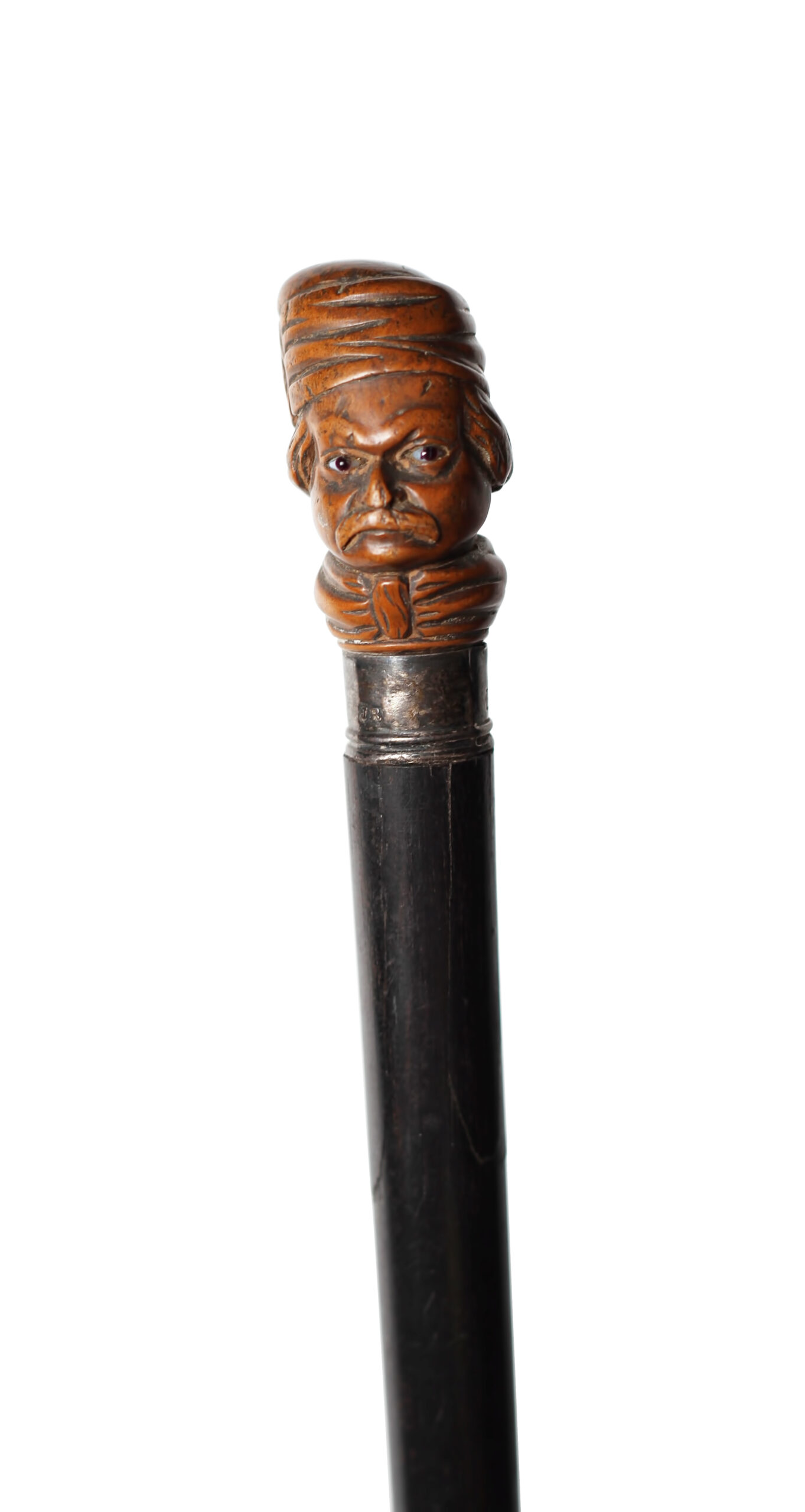Περιγραφή
Konstantinos Kanaris
A circa 1830 walking stick with carved wooden bust of Constantine Canaris with glass or bone eyes.
Length: 77 cm.
Konstantinos Kanaris, the Greek Revolution hero from Chios
Konstantinos or Constantine Kanaris was a Greek Admiral, patriot, and politician who lived during the period 1790-1877. He achieved prominence due to his heroism in the Greek War of Independence. He was a native of the island of Psara, a small island north-west of Chios. The year of his birth is considered to be 1793 or 1795. He became an orphan when he was very young. To earn his livelihood he became a seaman. It was three traders, who started the Friendly Society or Filiki Etairia on September 14th, 1814, in Odessa to revolt against the Ottoman Empire. Though they recruited supporters to initiate a revolution, Kanaris was not among them. On April 10th, 1821 he joined the revolution. In 1822, the Turks massacred 25,000 people in Chios, burning and destroying the island of Chios for 15 days under the command of Turkish Admiral Kara Ali Pasha. This was in retaliation for the support they had given a Greek rebel from Samos, who tried to free Chios. A full naval war broke out due to this massacre. However, the natives of Psara were skilled seamen, with fully equipped ships, experienced in fighting off the pirates. Konstantinos Kanaris became eminent as a fire captain. With fifty small ships and eight fire ships, navarch Miaoulis assaulted the Turkish fleet. On the night of June 6, 1822, Kanaris executed the revenge for Chios massacre, by killing Turkish Admiral Kara Ali Pasha. Konstantinos and his thirty-six men with two brigs fitted as fire ships approached the Admiral’s flagship Bourlota Saimaz, while they were celebrating the feast of Bairam, on the last day of Ramzan. He succeeded in attaching the fire ships to the monster, and in lighting the train. Kanaris and his men escaped, while 2000 Turkish naval officers, sailors and prisoners were instantly killed, as it blew up with a terrible explosion. The Admiral had jumped into the water but was killed by a falling spar. Between 1822-1824, Kanaris made three more successful attempts against the Turkish fleet, one in Tenedos in November 1822 and in 1824 at Samos and Mytilene. In 1825 in Alexandria, Kanaris was thwarted by contrary winds, when he tried to destroy Mehmut Ali’s ship, to stop his preparations against Greece. After this, the Turkish Sultan sought the aid of Egyptians, who had a superb army. Ibrahim Pasa, the adopted son of Egyptian Viceroy, had developed an army hiring veteran French officers, after the defeat of Napoleon. Pasha’s army was better equipped and organized than the Greeks, and outnumbered them as well. Pasha organized several successful campaigns against the Greeks, and made a successful coup, by destroying Psara on June 21, 1824. Although a portion of the natives escaped, the rest were slaughtered or sold off as slaves. Despite the blow of the destruction of his homeland, Konstantinos continued to fight valiantly. In 1826, as Greeks attempted to establish a regular army, Kanaris was made the Captain of Frigate Hellas. Despite this, the Greeks were fighting a losing battle against Ibrahim Pasa. It was only the combined naval might of Russia, France, and Britain that saved the Greeks. On October 20, 1827, in the Battle of Navarino, the Egyptian Fleet was annihilated. Finally, with the conclusion of the war, and Greece becoming independent, Konstantinos was initially made an officer of the new army of Greece. He went on to become an Admiral in the end. Eventually, Kanaris entered politics and distinguished himself as a politician. He was a follower of the first governor of Greece, Ioannis Kapodistrias. He served as Minister in several governments, including the Minister of Navy. Besides he served as Prime Minister for three terms, from March-April 1844, a second term from 1848-1849 and then a third term from May to July 1854. In 1862, he helped to oust the King Otto of Greece in a bloodless revolution. He helped to coronate Prince William of Denmark, like the King George I of Greece. Kanaris then again became Prime Minister for the fourth time from March to April 1864, and the fifth term from August 1864 to February 1865. Finally, he came back from retirement for the sixth term as Prime Minister from June to September 1877 to deal with the crisis of Russo-Turkish war. Kanaris died in office. He was buried in the First Cemetery of Athens alongside other celebrities and Prime Ministers. Following his death, Kanaris was declared and honored as a Greek National Hero. He was a very popular war hero, as he was considered to have acted with valor and was held blameless in the Greek War of Independence.





